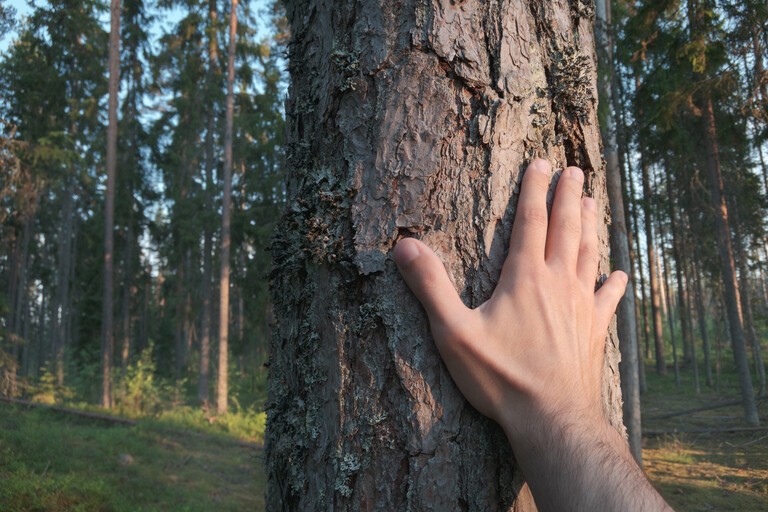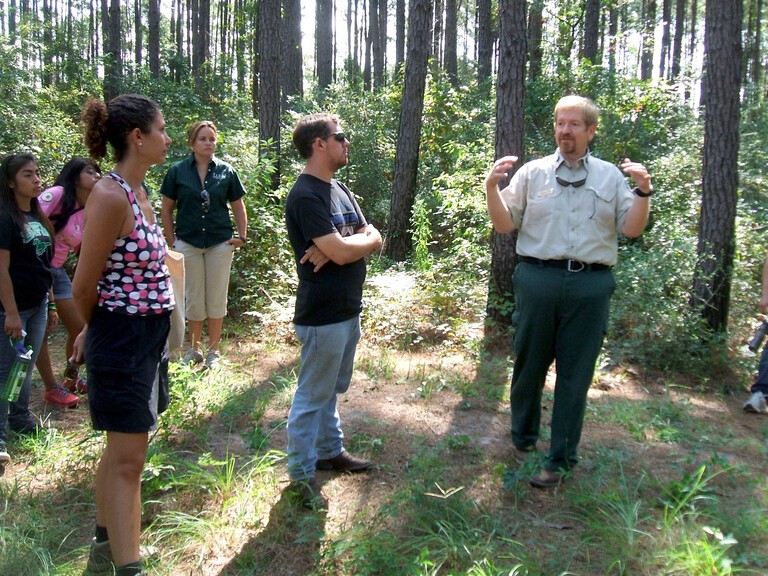Updates & Blog
Forest Therapy is More Than a Walk in the Woods

This article originally appeared in the April 2021 issue of Texas Highways and on the Southern Group of State Foresters’ Healthy Trees, Healthy Lives Blog.
The worldwide health and wellness movement of forest therapy has made its way to Texas. By joining forces, a land management expert, a medical professional and a trained nature therapist are bringing the research-based framework for healing and wellness through immersion in forests and other natural environments to the Lone Star State and beyond.
A Long Soak in a Sea of Green
How the Japanese practice of forest bathing is connecting underserved Texans with the benefits of communing with nature

“So, forest bathing?” my husband inquires dubiously on a sublime fall day as we drive south on Our Highway of Perpetual Construction, Interstate 35. We’re heading from Austin to New Braunfels, where I’m going to investigate this exact practice.
“Yes?” I counter.
“Are you sure this isn’t going to be a repeat of that Jemez Mountains deal?” he asks.
That “Jemez Mountains deal” was a cross-country ski trip we’d taken in New Mexico. Our destination was a “secret” hot spring where we’d envisioned taking a blissful, private soak. When we approached the rising mist at the end of a long, snowy trail, however, we spotted three burly German tourists, completely nude except for surprising amounts of body hair. Friendly types, they all stood to greet us. Hard pass on tubbing with the Teutons.
El Hubbo’s confusion and skepticism are understandable. “Forest bathing” is an unfortunate translation of shinrin-yoku, the name coined in 1982 by the Japanese government when it began promoting immersion in nature to combat skyrocketing suicide rates. Dr. Qing Li, a member of Tokyo’s Nippon Medical School, later used science to back up the intuition that nature is good for humans with his 2018 international bestseller, Forest Bathing: How Trees Can Help You Find Health and Happiness.
The results of the Japanese government’s experiment were so promising that scientists around the globe put the simple practice of spending mindful time outdoors to the test. In the four decades since, a whopping 290 million participants from 20 different countries were tracked in hundreds of studies. Scientists measured everything from how much more stress levels dropped when strolling in nature instead of along a city street, to how much faster sick patients recovered when they had a view of trees rather than a hospital wall. The research confirmed what we know intuitively: Spending more time outside is good for our bodies and minds. Unhurried strolls in forests, parks, and leafy neighborhoods—even along golf courses—can be effective for helping to lower heart rate, blood pressure, and anxiety.
Hello anxiety, my old friend. Like most sentient Americans, the cascade of jarring events loosed upon us in recent years has left me as jangled as any Japanese commuter being stuffed onto a Tokyo subway. Could forest bathing, I wonder, be a way to help me ditch my blood pressure pills and achieve serenity?
Since I spent a fair chunk of my childhood as an Air Force kid on bases in Japan, I understand how immersion in their serene pine forests and artfully manicured gardens could be a Zen experience. Texas on the other hand? A state where, historically, nature has been a hostile place always trying to attack us with a cactus spine, a rattler fang, or scorching heat? Would this practice even work in Texas?

“Forest bathing most certainly does work in Texas,” John Warner, a recently retired Urban District Forester with the Texas A&M Forest Service, assures me with infectious enthusiasm. The 32-year veteran of the state agency became an ardent advocate of forest bathing because it connects perfectly with his mission to teach citizens that public lands are essential. For him, the practice is “a no-brainer.”
“People won’t protect or advocate for something unless they have an attachment to it,” Warner says. “We have 29 million people in Texas; we want to get every one of those lives touched by nature. We want to get them attached to forests. That’s the reason I got involved.”
In 2019, Warner set up the state’s first forest bathing program at W.G. Jones State Park in Conroe with the help of volunteer guides. [… Full Article]